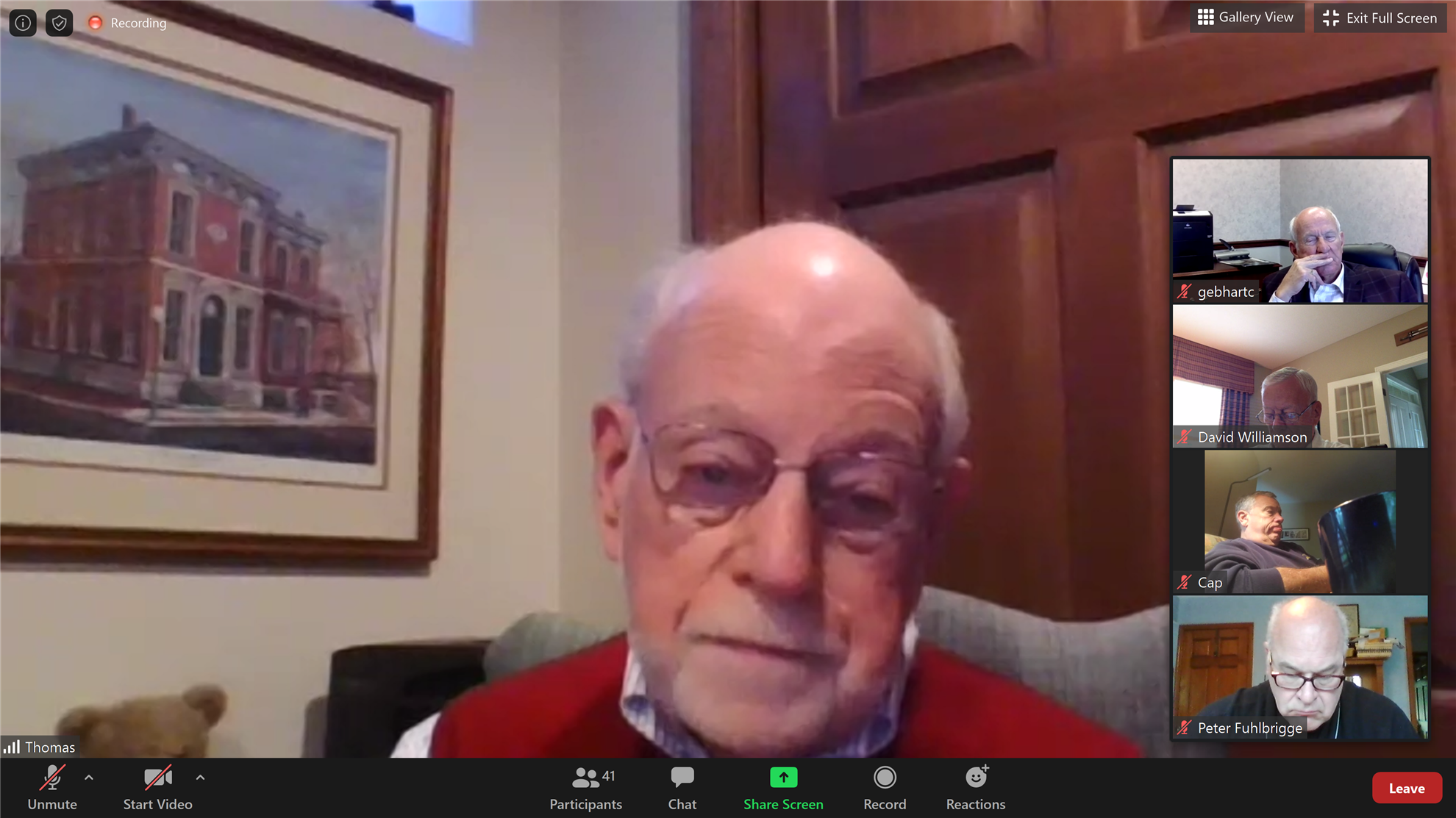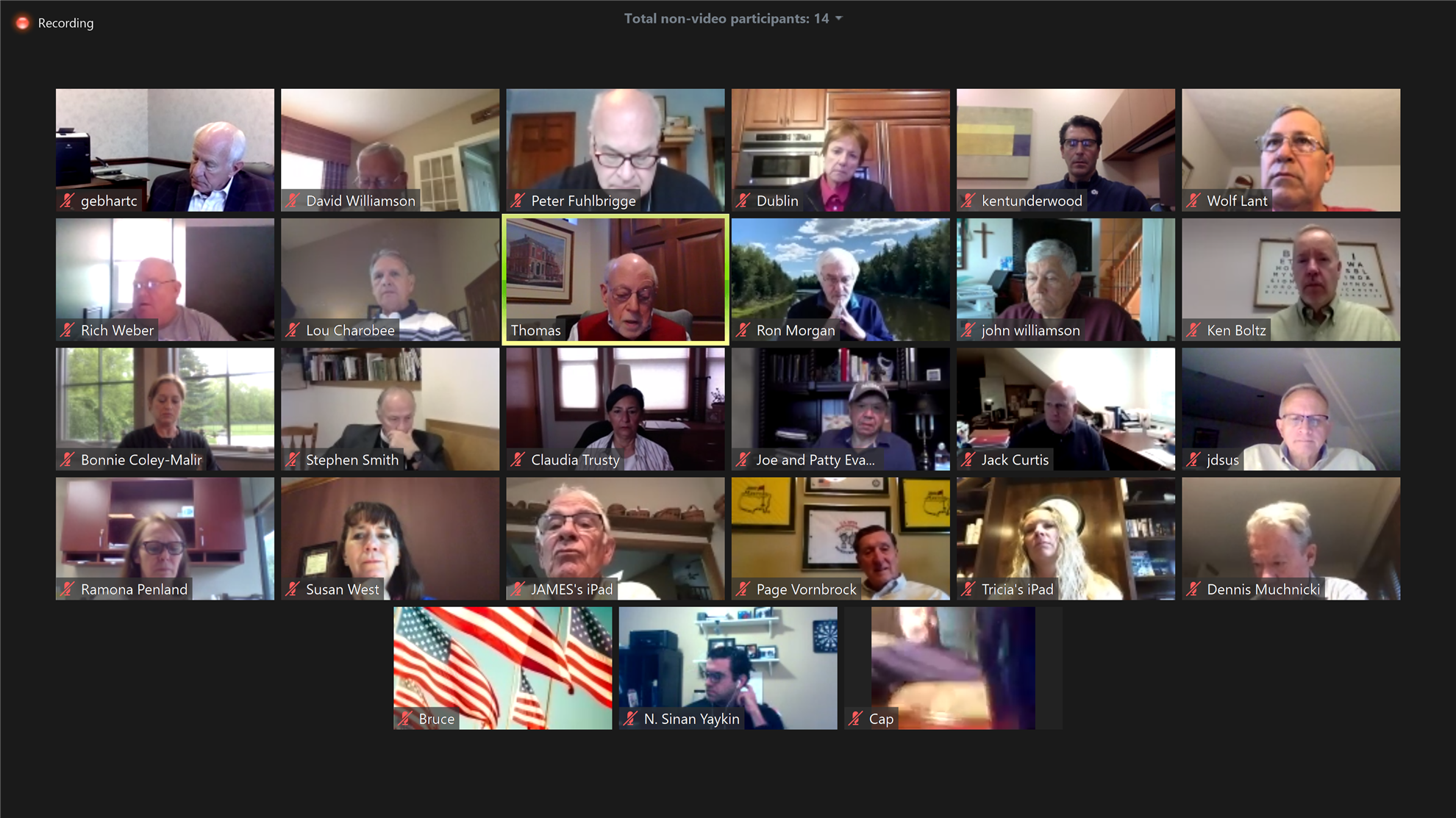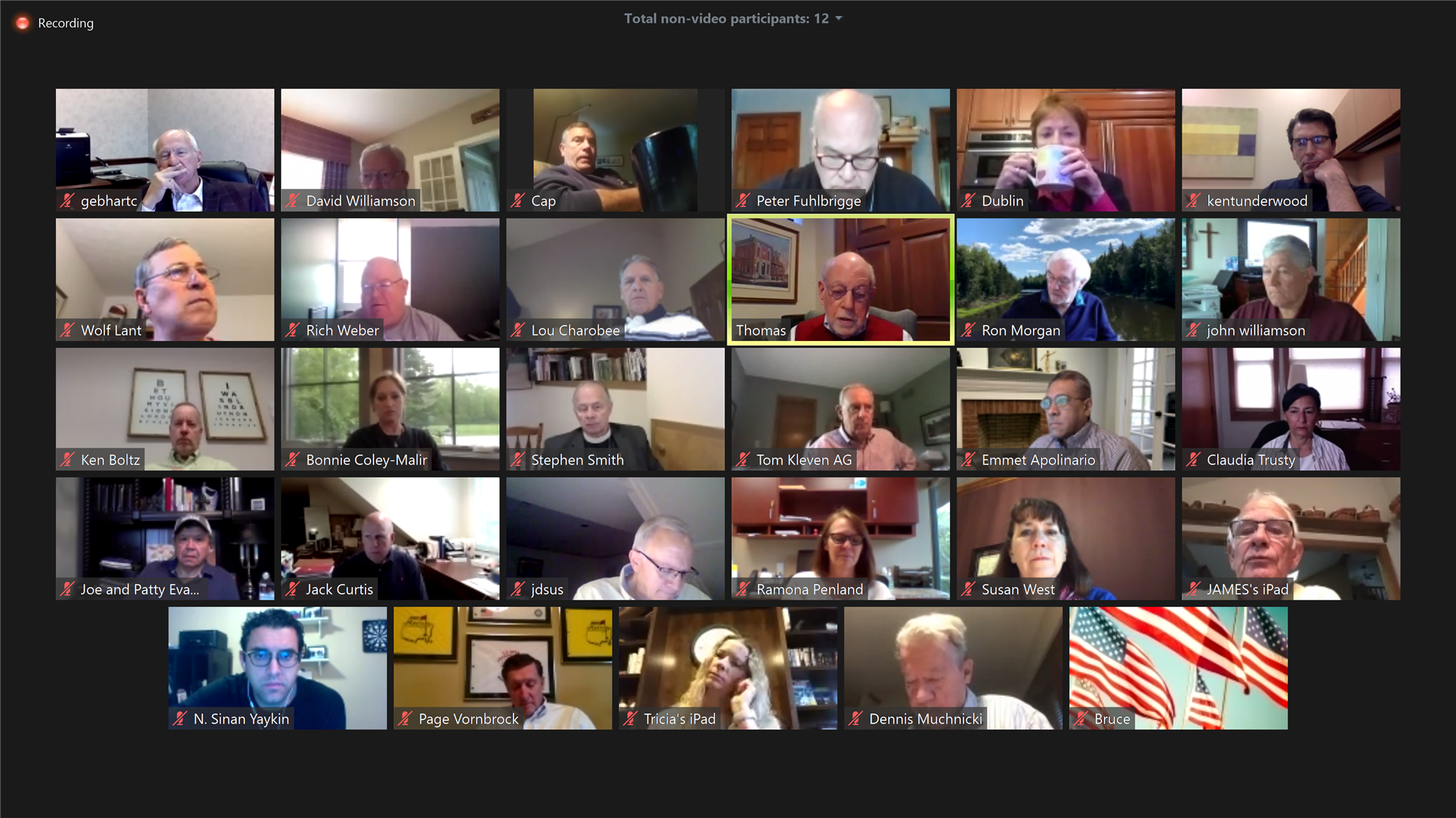If you missed this great presentation, catch the recording here:
Announcements
- Claudia is working on Rotary branded masks- please contact her if you would like to purchase any masks.
- We will be moving to a fundraiser versus the ProAm event, more details to come
- Unfortunately, the 2020 Miracle League Season has officially been canceled
- Meeting format will remain virtual for the time being.
 Tom McGloshen- Dealing with Friends that are Seriously ill
Tom McGloshen- Dealing with Friends that are Seriously illWe had the great privilege to hear from Tom McGloshen regarding how we can better support friends who are critically ill, or have experienced a loss of a loved one. We don’t always know what to say, or do when someone is critically ill, or coping with loss.
Two very important things to keep in mind:
- Remember who we are and who we are not
- Expressing we care, listen to what our friend or loved one is saying and learning from them is extremely important
Another approach you can take is to use empathetic guessing. An example may be; “If you want to talk, I am here”. It is a great way to show someone you care.
The key is that we listen very carefully as the person struggling will tell you what to say next. Dealing with loss and illness is never easy. The most important thing you can do to support a friend, or loved one is to be there for them.
If you are someone you know is struggling, please leverage your club and community resources.
- Syntero’s website has some great information and services to offer https://www.syntero.org/
- Tom will also share out his “what to say and what not to say” in the near future
To view the complete text of Tom's presentation along with the what to and not to say, click here
Dealing with Friends who are Seriously Ill
Dublin A.M. Rotary
May 22, 2020
The Rev. Thomas H. McGloshen, Ph.D.
In dealing with friends who are seriously ill, we often don’t know what to say. We do a dance of approach and avoidance. We’re interested. We care. And, we want to communicate all of that—without being intrusive or insensitive—but we’re not sure how to make that connection appropriately.


Dealing with Friends who are Seriously Ill
Dublin A.M. Rotary
May 22, 2020
The Rev. Thomas H. McGloshen, Ph.D.
 In dealing with friends who are seriously ill, we often don’t know what to say. We do a dance of approach and avoidance. We’re interested. We care. And, we want to communicate all of that—without being intrusive or insensitive—but we’re not sure how to make that connection appropriately.
In dealing with friends who are seriously ill, we often don’t know what to say. We do a dance of approach and avoidance. We’re interested. We care. And, we want to communicate all of that—without being intrusive or insensitive—but we’re not sure how to make that connection appropriately. Added to this is the fact that most people who are seriously ill don’t want to be abandoned, especially by us, their friends. So, they want us in their lives—especially at this moment—just at the time that we are inclined to back away, because we are so often so uncomfortable. That phenomenon leaves everyone unhappy.
But we can learn how to deal with these difficult situations. To take a step back, I’m working on a book that addresses the response of faith to crises in
living. In there I have a chapter on “Dealing with Difficult People.” Today’s topic is kind of a sequel to that chapter because the person who is seriously ill is really just another of those difficult people. “Difficult” not because they’re trying to be but because their illness is making life difficult for us. We don’t know what to think or do or say.
I offer a two-fold approach to dealing with difficult people: first, it’s a matter understanding boundaries (where we leave off and another begins) and it’s a matter of understanding ourselves (who we are in our social and cultural environments).
In this case, the boundary issue has to do with the fact that our friend is ill, and, whether or not we happen to share that illness, our friend’s illness belongs to our friend and not to us. That is one aspect of the boundary issue. Another, as Stephen Smith reminded us, is the extended family—maybe parents, children, a spouse—all living within the same boundary perimeter as our friend. And, let’s not forget the medical staff who often adopt the patient as their own. As Stephen pointed out, all these people (professionals and family alike) are subject to compassion fatigue and burnout. Maybe these folks are experiencing anticipatory grief. When I served as a chaplain at Children’s Memorial Hospital in Chicago during seminary, those of us in the chaplaincy program were told that not only were the patients in our charge, but the patients’ families and the medical and administrative staff at the hospital as well.
After Kathryn Michelich-Helms left what was the Dublin Counseling Center, another Rotarian, Julie Rinaldi, was named executive director of what is now known as SYNTERO, an outstanding facility now with four locations in central Ohio. She suggested, in her very fine presentation just two weeks ago, that we remember the resources they offer in mental health services for us as individuals, as couples as families and as caregivers who might need extra help for those for whom we care as well as for the family members who provide the care directly. Julie suggests that all the information one needs is available through their web site (SYNTERO.org).
In terms of understanding ourselves, we might be sad and scared for our friend. We want to be helpful and sometimes ashamed that we don’t know how. Interestingly, just as a friend’s marital crisis often provokes us to take a second look at our own relationships, a friend’s serious illness will often remind us our own mortality—seldom a comforting thought. So, it’s our friend who is ill, but we’re having all sorts of problems with it. Sometimes we have so much of a problem with it that it is our friend who is comforting us, a turnabout in the dynamics of things.
Some years ago, a friend of mine knew I had bloodwork done following cancer surgery. He cared about me and the results of my test, but as he later admitted, he was afraid to ask me about it. His fear lay at several levels: he feared that the test might have brought bad news and that he wouldn’t know how to handle that information; he feared that the test had brought bad news and that I wouldn’t know how to handle it; and he possibly feared—as is often the case—that I would suddenly be reminded that I had had cancer, which is not something one can easily forget. Again, the paradox is that I wanted him to ask me about it if he were interested, regardless of the results, and I wanted him to be comfortable doing so. I wanted his interest and his presence with me and I wanted to be able to talk about what turned out to be my relief that I was still doing well. But I would want someone close to me whether I was doing well or not. I don’t want to be abandoned. So, you see, one of the things that happen to us or to our friends who are seriously ill is that we’re often abandoned by those with whom we want to be close, all because we often don’t know what to say with each other.
More importantly, we often don’t know how to be with each other, an issue Terry Hofecker addressed. He called it “the ministry of presence,” so important to our understanding. In our contemporary vernacular, we call that, simply, “showing up.” that, simply, “showing up.”
In Susan West’s email announcement of today’s program, she appropriately noted that communicating nowadays with seriously ill friends and family from a distance is a challenge. The Columbus Dispatch last Sunday had an article about how that challenge is being handled by hospital chaplains. Certainly, when they’re able to enter the patient’s room, they wear personal protective equipment and maintain appropriate distance. But as Stephen Smith pointed out—and I experienced as a hospital chaplain—much of the work for patients is done indirectly through family members. Some of the patients in a children’s hospital are either too young or too sick to engage. Nowadays local chaplains are communicating by phone, if entering the patient’s room is not advised. And as we already acknowledged, a patient’s family not only needs but also deserves our attention.
There’s a paradoxical side bar to our dealing with the “ministry of presence.” It’s in the is the church’s celebration of Epiphany on January 6, the twelth day after Christmas. It was, according to the Biblical account, the moment when the three wise men came to see the new-born Jesus. The misunderstanding many people have about Epiphany is that it was that the wise men appeared to Jesus; to the contrary, it was that Jesus appeared to the wise men. They were moved by their experience with him and left not only in a different direction than that from which they came but left as different people than they were when they arrived. Likewise, it’s not so much that we’ve blessed our friend with our presence—as important as that might be—but that our friend has given us the opportunity to experience our relationship at a whole new level.
And when fully present, we’ll be careful with what we say. Sometimes, even with evidence to the contrary, we might say something glib like, “I know you’re going to beat this. This illness can’t keep you down.” That might make us feel better, but it’s an insult to our friend’s experience of the illness. Our friend knows better and we’re disregarding that experience.
In an attempt to reach across the boundary that divides us to establish a connection with our friend, we might say, “I know how you feel.” But, even if we’ve had the very same illness, we really don’t know how another person is feeling or thinking or has sorted out the whole constellation of life as it has been impacted by this illness.
I’ll bet that, when you’ve had something happen to you, whether you’ve broken a bone, been in an accident, had cancer or a stroke or heart attack, many of the people you tell will let you know that they’ve had that same experience. Sometimes this is where, “I know just how you feel” comes from. But the truth of the matter is that the present conversation is not about us; it’s about our friend and we don’t know how our friend feels, so let’s leave it there rather than shifting the focus from our friend to ourselves, maybe to collect some of the sympathy we wanted, but didn’t get, when we were suffering.
With regard to disappointing test results, our friend does not want to hear, “It must have been a fluke in the test,” or “I’m sure it’ll be better next time,” or simply, “You’ll be OK.” Our friend is likely to be wondering how we know that and why it’s so easy to disregard his or her own experience.
Well then, what do we say? Let’s begin by remembering who we are. We care about this person and we’re interested in how he or she is doing. We’re not our friend’s physician; we’re our friend’s friend. We’re not doing research into our friend’s illness. We’re not psychic, knowing what our friend is thinking. What we know is that our friend is ill and that we care about that.
We might do what is called “empathetic guessing,” saying something like, “This might be kind of scary,” or “I wonder what that’s like for you,” or “If you’re ever interested in talking about what’s going on with you, I’m interested and will listen.” Even more simply, what I tell my grad students who are seeking licensure as therapists is this: If you listen very carefully, your patient will tell you what to say next! That is to say, if we follow the lead our friend gives us, we’ll stay in the conversation most important at the moment.
There are a couple other places, very sensitive places, you might consider going. The first takes us back to the matter of understanding ourselves, and this is more about us than about anybody else. Here’s the thing, if the person who is ill is a family member—especially a parent--and that illness might be a terminal illness, we might want to ask ourselves the question, “Am I ready for my mother or father to die?” In one respect, it’s never a good time for family members to die, but, more specifically, are we at peace in our relationship with those people? If not, this might be the time to try to set things straight—especially, again, with a parent--because the loss of a parent with whom one has a contentious relationship is one of the hardest griefs to resolve. Our parents might not be open to reconciliation, but, if we’ve made a good-faith effort at reconciliation, then we can be reasonably OK with that part of our lives. We’ll still have to grieve not only their death, but also the death of the dream that we would have somehow resolved our differences before they died. Good psychotherapy around grief work can ultimately bring closure to that chapter of our lives, but, if possible, it’s better done earlier.
A second issue, again, a very sensitive issue, has to do with our friend or relative who knows that death soon awaits and is willing to talk about it. A question we might ask, if we’re willing to deal with the answer, is this, “Given your condition, what is the best way you can imagine spending the time you have left?” This is a testimony to the fact that the person is still alive, still has options, and that you care enough to explore those possibilities. That is truly a gift we can offer.
In concluding our conversation with our friend, I would suggest more things not to say—even though we would have the best intentions. “Here let me do such and such for you,” (which is actually manipulative) or, even, “How can I help you?” (which presumes that we can help). Rather, we might want to say, “Is there a way I can be helpful?” (which presumes nothing and allows our friend to maintain a sense of dignity and control). I asked that of a dear friend, in a phone call, who eventually lost her own battle with cancer, and her response was, “You’ve already been helpful, just by calling.” I didn’t expect that response, but it was her response and it was a perfect reflection of where she was and what worked for her.
When a friend is seriously ill, let’s remember who we are and who we are not and the boundary that separates us. We are concerned but we’re not the one who is ill. This is our time to say that we care; our time to listen and learn. To the extent they would have us, this is our time to enter their world with a sense of wonder. A classmate of mine in seminary, reflecting on our future roles as counselors, remarked that, when people tell us their very personal stories, we’re at a place similar to the Biblical account of where Moses was beside the burning bush, and God said, “remove the sandals from your feet, for the place on which you are standing is holy ground (Exodus 3:5)”. This is also a sacred space for our friend and, with their invitation, for us as well.